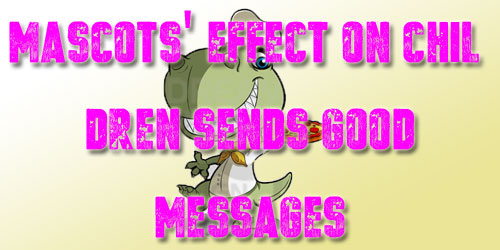 17 March 19
17 March 19
Mascots' Effect On Children Sends Good Messages
Youngsters and Mascot Mental Images
Mascots hold a solid mental image for most people that come in touch with one. But mascots impact on children is a lot stronger and profound than with any age group. Youngsters often respond with fondness to mascots that exhibit positive characteristics. A kid could be delighted incidentally a mascot dances or any humorous physical activity the mascot engages in. This is especially true in case a mascot is the embodiment of a product that a baby wants his / her parents to get for them. Mother and father are often vulnerable to the marketing field. This is correct since many goods such as toys and games, games, and food items are purchased by parents with respect to their children. Young children may be very persistent in making certain their parents choose the most current cereal or doll because a mascot said it had been great. In addition, children that are not yet literate may really gravitate towards a mascot. Youngsters at this time of development look for photographs or symbols that signify familiar what to them.
Mascots as Tough Symbols
Children may be the most sensitive of most age ranges to mascots and their symbology. An adult might be able to discern in case a product or photo a mascot can be portraying is usually worthless, while a kid may see something completely different. Before language skills are strongly created, children tend to remember events and people in snapshots like photographs in their reminiscences. Mascot Logo Design Company may be able to grab a place in a very child's mind that will be vivid and keep meaning up for the child.
Good Vibrations
The positive feelings that mascots elicit from youngsters are often associated with what a mascot does and not simply something itself. Regarding sporting clubs the mascots impact on children could be to excite or enthuse them about the team or a game occurring. Not to mention once again, children may be attracted to the mascot on a personal level. Rather than wanting something lauded by way of a mascot, children may want something that signifies the mascot such as a: stuffed animal, shirt, pennant flag, or pin. Mascots in of themselves can be easily advertised to children to promote team sales. As well, the mascot may encourage a new era of fans to be realized from the team.
Mascots, Universities, and Self-Image
Elementary schools around college campuses heavily make use of mascots to convey team image and assist in promoting team nature. Mascots impact on children is quite strong when dealing with school mascots. Children face the image usually on a daily basis. The institution mascot may be present in the schools' outside indication or within the wall or flooring of the fitness center. Also, children who play sports may use uniforms that have the mascots proudly positioned upon them. Children may come to find out themselves as getting lots of the same characteristics because the mascot if they participate in group sports. This is why mascots that encourage a positive image are very important for school aged young children. Negative mascots impact on children may advertise negative images of the school or perhaps actually affect a child's self-image.
Responsible Rendering of Mascots
Since mascots impact on children is greatly profound adults have a responsibility to generate mascots that send out a warm and constructive message. They need to keep the very best interest of children in mind when designing the costume to the mascot. Also, what on the Mascot Logo Design Agency have become important. The person portraying the mascot comes with an obligation to act enjoyment and upbeat, without participating in any behavior that could have a poor or damaging connotation. This can only help paint the team or merchandise in a confident light with not merely children, but grownups as well.


Comments